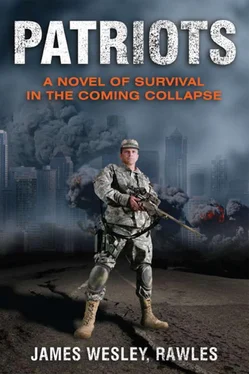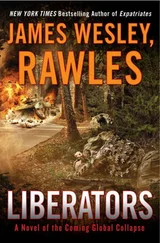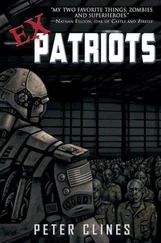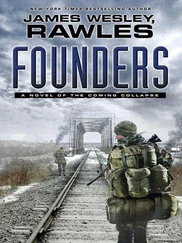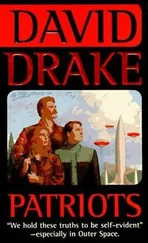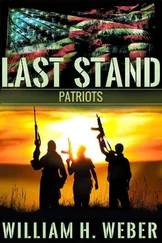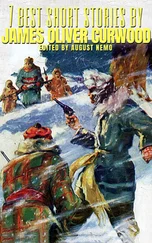“Now, let me tell you a way you can do your own encryption that is simple but virtually indecipherable. It’s called a ‘book code.’ Get yourself two copies of the same book. A big fat novel works best. It has to be the same book, from the same publisher, and the same edition . Don’t use a Bible or a dictionary, because that is too obvious, and because in a dictionary each word only appears once. To encode, you look through the book and first find the words you want to encode. You write down groups of numbers, starting with page number, then paragraph number, then line number, and the number of words into the sentence where your word sits. If you can’t find the complete word, then you spell it out a letter at a time, using the first letters of words you select. You write it all down in groups of three numbers. Between each group, you say ‘break.’ So a transmission would sound like: ‘202, 003, 015, 003 Break. 187, 015, 006, 018 Break,’ and so on. As you use each word, you scratch it out, so you never use the same code groups twice.
“The only risks with book codes come when a radio operator, or a copy of the book, or even just the title of the book are compromised. For that reason, you should change books frequently. You should also institute a list of ‘telltale’ operating procedures that an operator can use to discretely let everyone on the net know that he has been captured and is being forced to transmit under duress. Back before the Crunch, there was also the risk of a book code being decrypted. Conceivably, the NSA could have set one of their Cray super computers to work and break the code by brute force, or perhaps by determining which book was being used, by working from databases of known texts. Under those circumstances, I’d recommend using pairs of obscure novels—either long out of print or published by a small ‘vanity’ publisher, for your codebooks. But under the current circumstances, I’d say that book codes are relatively secure, so long as you don’t ever reuse code groups.” After a pause, Edgar added, “And needless to say, regardless of the encipherment system you are using, the party is over once the code book falls into enemy hands. They’ll be reading all your traffic, past, present, or future.
“If he is spelling out letters, rather than giving the position of complete words, the guy transmitting says ‘Lima’ before the applicable groups. After every five groups, you change frequencies, using a large preset frequency table. You make the switch short and sweet. Just say something like ‘Zap 22,’ to change to a frequency from the table, like 146.3 megs. That way, they aren’t likely to transcribe the entire encrypted message, and they are much less likely to be able to coordinate with other out-stations to get a cut or fix on your location. The guy transmitting waits a ten count to allow the guy at the receiving end time to retune his receiver; then he continues with the next five groups. There is no need for the fellow at the receiving end to key his microphone unless he needs you to repeat some groups. For example, he’d just say, ‘Please say again, last five groups, Zap 14,’ and retunes. Once he has the full message down, he just says ‘Roger out,’ and then he decodes it using his companion book, off-line. Simple .
“Book codes are similar to what the military and spooks call ‘one-time pads.’ One-time pads are computer generated, and naturally working computers are few and far between these days, so a simple book code is your best bet. I suppose that if we still had PCs and Macs, we could be running Nautilus or PGP Fone, and really get those Federal boys scratching their heads.
“The Federals and their UN counterparts have far more elaborate intercept systems than ours, some of which are road-mobile. We’ve even spotted some of the old mobile FCC intercept vans. Their modus operandi is to watch the spectrum on a spectrum analyzer—a box that looks like an oscilloscope. When a signal’s ‘spike’ appears on the screen, they tune to that frequency and listen briefly, to distinguish whether it’s a Federal or UN signal or something from a resistance unit, or civilian traffic. If the signal looks significant, a message is passed by intercom to someone ‘sitting pos’ at one of the DF consoles. That operator tunes to the same frequency and takes a line of bearing. Then they radio to another intercept site several miles away, and get a comparison line of bearing (LOB). This two-LOB ‘cut’ is plotted on an acetate-covered map. Three or more LOBs constitute a ‘fix.’ After comparing the map to known Federal/UN unit locations, the shift commander can authorize an artillery fire mission, or can dispatch a foot patrol to investigate. When things work right, the Federals can get ‘steel on target’ less than five minutes after a transmission is made, even if the transmission lasts less than a minute.
“A three-LOB fix generates a circular error probability or CEP of around half a kilometer across. And that circle—well, actually it’s an ellipse—is good enough for artillery work. Especially when they use a serious area effect weapon like their rocket thingy—what do they call that, M-S-L-R?”
The XO corrected him. “MLRS. It stands for Multiple Launch Rocket System. They also have some old Russian 122-mil rocket launching trucks. They call those Katushyas. I’m not sure if you’ve ever heard a rocket battery do its thing from anywhere nearby. It sounds like the gates of hell opening up. You just pray that you aren’t the intended target. The Federals call the rockets their ‘grid square eliminators.’”
Edgar resumed. “And again, the CEP plots that the Federals can do are within a one-kilometer map grid square. You put the DF capability together with the rockets, and you’re talking serious trouble for any of the militias that aren’t using their radios properly. That’s why ComSec is so important.”
The XO jotted on his notepad:
Intercept = DF = MLRS = Death
The lecture went on for another hour, followed by a long series of questions and answers. Most of Scheimer’s questions were about the pieces of radio and cryptographic equipment that his Blue Blaze Irregulars had captured.
Eventually, Scheimer added to his notes:
Use short transmissions, only!
Use lowest power possible to get the message across.
Lower power means LPI.
Change frequencies and callsigns daily!
Don’t mention frequencies or CB channels, even if encrypted. Instead, use brevity codes, such as “Zap 1” for 147.235 MHz, and “Zap 2” for 142.370 MHz.
Build an extensive frequency change table, and change it regularly.
Use offset transmit and receive frequencies.
Use encryption as much as possible!
Narrow-band vs. wide-band frequencies.
Use variable speed tape recorders to create “burst” transmissions.
Use directional antennas vs. whips, where practical, to increase range with same power, and lower probability of interception.
Bounce transmissions off of steel grain elevators to confuse enemy DF.
Don’t transmit from a bivouac site!
Use excess captured radios and 60-minute tape recordings of nonsense code groups, at fixed frequency, to make enemy waste field arty ammunition. ;-) Move at least one kilometer after each five minutes of transmission.
Don’t use the same bivouac site twice.
Assume that “everything you say can and will be used against you” by Comint collectors.
A better antenna beats more power, since you get: 1) Less power usage, hence LPI, and
2) Better reception and transmission.
• • •
The two Northwest Militia base camps kept in contact with the pair of microwave transmitters that had been donated to the resistance by Edgar Rhodes. The Gunnplexer microwave transmitters used ten-gigahertz Gunn oscillators and weatherproofed eighteen-inch diameter aluminum parabolic dish antennas.
Читать дальше
